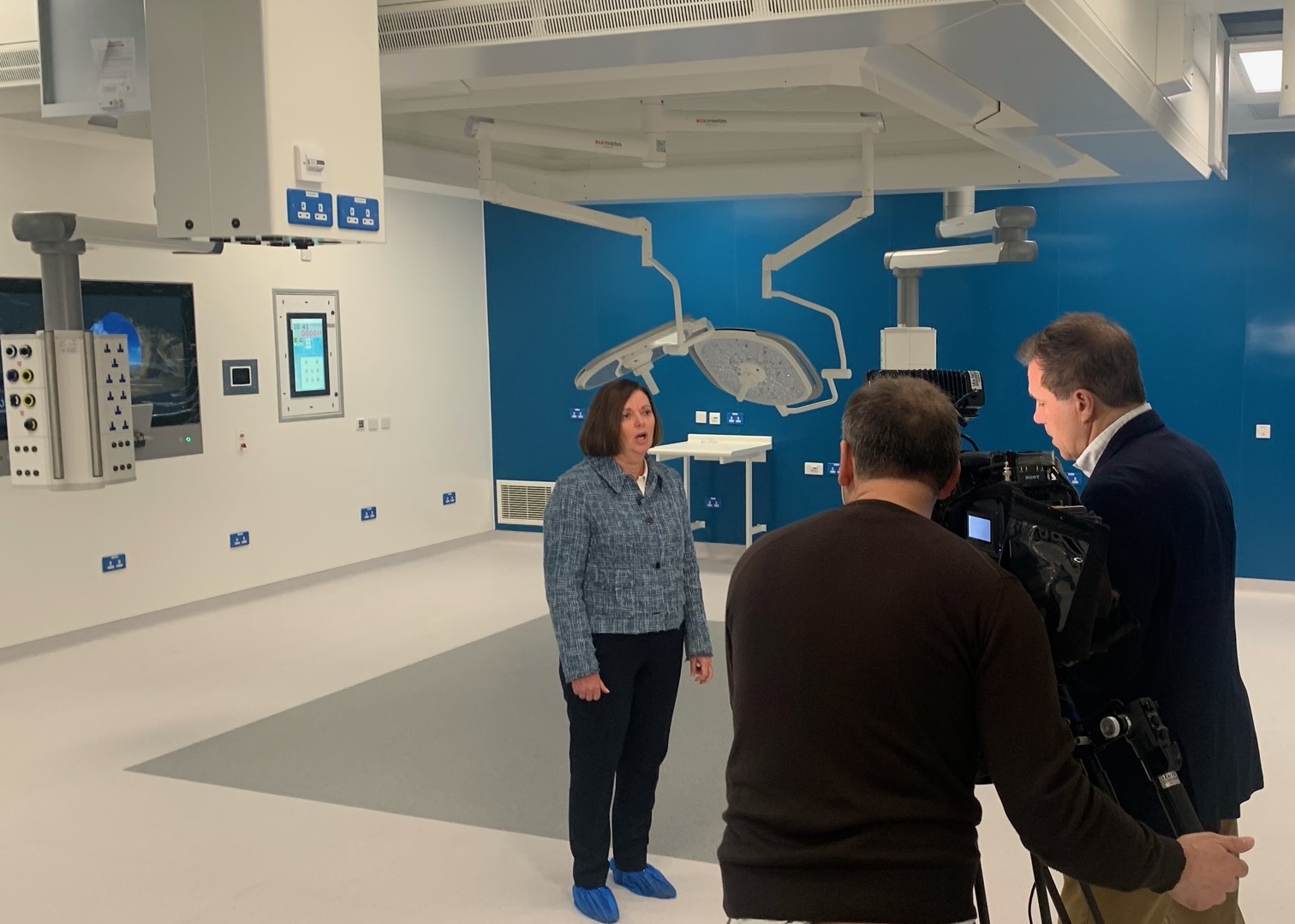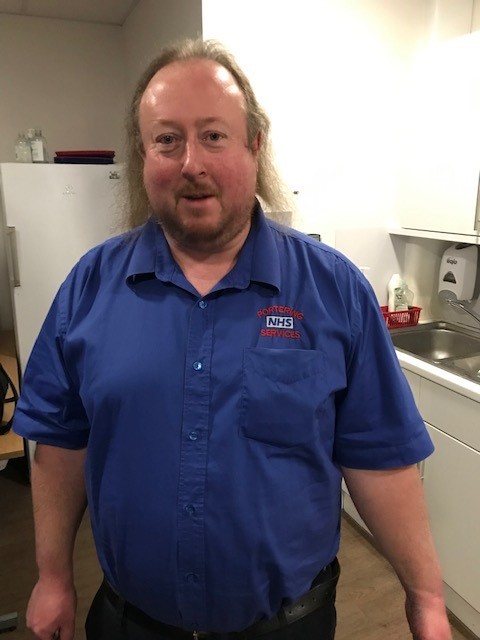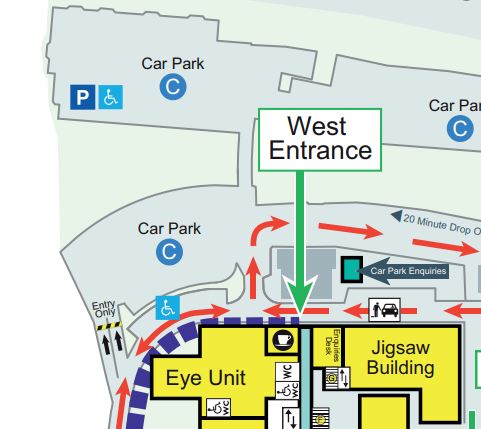Poole theatres in the news
Richard Slee, ITV Meridian News, visited Poole Hospital (23 February) to see progress on the new theatres complex, including access to our new four-table ‘barn’ theatre – the first of its kind on the south coast where multiple operations can take place under individual ultra-clean air canopies.
He also had a chance to see the latest on the new BEACH building at Royal Bournemouth.
You can find out more about the visit and watch the news report here.
University Hospitals Dorset leads the way in the south with new technology for heart operations
The cardiology team at University Hospitals Dorset (UHD) is using a revolutionary new technology for atrial fibrillation procedures, cutting operation times for patients by half.
Atrial fibrillation (AF) is the most common heart rhythm abnormality seen in the UK affecting over one million people. It can be an extremely disabling condition, commonly causing symptoms such as shortness of breath, tiredness, palpitations and a significant reduction in exercise tolerance.
Previously, cardiologists have treated AF through targeting and abolishing the electrical signals in the heart responsible for triggering the arrhythmia, by burning or freezing them away. The procedure carries a small risk of causing damage to surrounding areas, such as the oesophagus, or important veins leading from the lungs to the heart. With Boston Scientific’s new Pulsed Field Ablation (Farapulse) technology, non-thermal energy is used to target the same signals, in a tissue specific manner, minimising any external collateral damage.
The procedure now takes around an hour, reducing by half the time it would previously typically take, and UHD is one of just four hospitals in the country currently using the technology, and the first on the south coast.
Dr Richard Bala, consultant in cardiac electrophysiology, said: “This technology is great news for our local population. Atrial fibrillation can cause real difficulties to people’s lives and we see a variety of patients of all ages from 18 to 80 and beyond with the condition. The treatment is quicker, safer and as effective and we hope the higher number of patients we can see and treat in a day will considerably reduce waiting times.”
Dr Bala added: “Since starting, we have already treated a number of patients, and the initial results are looking very good. Additionally, when patients are woken up from general anaesthetic, they are not reporting any adverse effects either from the procedure, whereas they may have felt some discomfort before. We are very happy and excited to see these benefits in our patients.”

Visit our hospitals responsibly
Cases of Covid-19 are rising in the community, and likely to remain high for the next few weeks.
To prevent the spread of infection, please continue to wear face masks in appropriate areas of our hospitals and follow good hygiene practices.
Masks are no longer required in ‘public’ areas in our hospitals, including entrances, waiting areas, corridors and restaurants. Staff, outpatients and visitors who choose to continue to wear masks (or due to a risk assessment) should still do so, and we will keep providing masks at our entrances for this purpose.
If you have an outpatient appointment or are visiting a ward, please take a mask from here to put on in these areas if you do not already have one.
Mask wearing currently remains in place in all inpatient (ward) areas, as well as in clinic rooms and in our urgent and emergency care settings, eg our emergency departments, urgent treatment centres and same day emergency care (SDEC) facilities.
Masks will continue to be required for patients with suspected Covid-19, where they are tolerated and clinically safe to wear.
We ask everyone to continue to follow good hand hygiene practices, including the regular use of hand gel, and to stay away from our hospitals if any symptoms of Covid-19 or other viral illness are present.
Thank you for your continued support.
National acclaim for hospital porter
A porter from University Hospitals Dorset has been recognised for his services and dedication to the NHS.
Paul MacKay received a finalist nomination in the Dennis Southern Lifetime Achievement category at the MyPorter Awards 2023 in association with NHS England, a national celebration of portering teams and individuals who go above and beyond in their roles.
 Speaking about his reasons for nomination, Stuart Williams, UHD porter and security manager, said: “Paul started with the NHS in 1995 and has served ever since. He has seen many changes, managers and colleagues come and go, and has ridden through all this while offering a wealth of experience, reliability, sense of duty and respect to his team, and our patients and visitors.”
Speaking about his reasons for nomination, Stuart Williams, UHD porter and security manager, said: “Paul started with the NHS in 1995 and has served ever since. He has seen many changes, managers and colleagues come and go, and has ridden through all this while offering a wealth of experience, reliability, sense of duty and respect to his team, and our patients and visitors.”
“In February 2022 Paul suffered a serious physical attack from a patient, leaving him suffering from severe head trauma. Paul dealt with the whole incident, recovery and return to work as a professional, extending his consideration to the patient who inflicted the attack as a consequence of the patient’s personal suffering.”
“Paul gave full support to his management to administer occupational health support, and collaborated to provide a proactive return to work that included a return restraint support amongst the porter team at appropriate incidents.”
“Paul has now fully returned to operational duties over the past nine months and has showed enormous strength of character to continue in his role; supporting our porter service, the trust, and the NHS. I am incredibly proud of him.”
Speaking following the awards ceremony, Paul said: “It was an enjoyable experience and nice to see porters receive recognition. I was nervous as to what to expect but this soon changed when the ceremony took place and I was awarded a certificate in recognition of being a finalist for the lifetime achievement category. I would like to hope that this opportunity is given to many more porters in the future.”
Parking disruption within car park C and outside west entrance at RBH
Ongoing work within the main public car park (Car Park C) and outside the Eye Unit/west entrance on the Royal Bournemouth site has led to a reduction in the number of parking spaces. The work also affects the flow of traffic around the site and may result in some delays in dropping off and collecting patients. We apologise for the inconvenience this may cause and ask that visitors allow additional time for travelling to appointments and parking.










